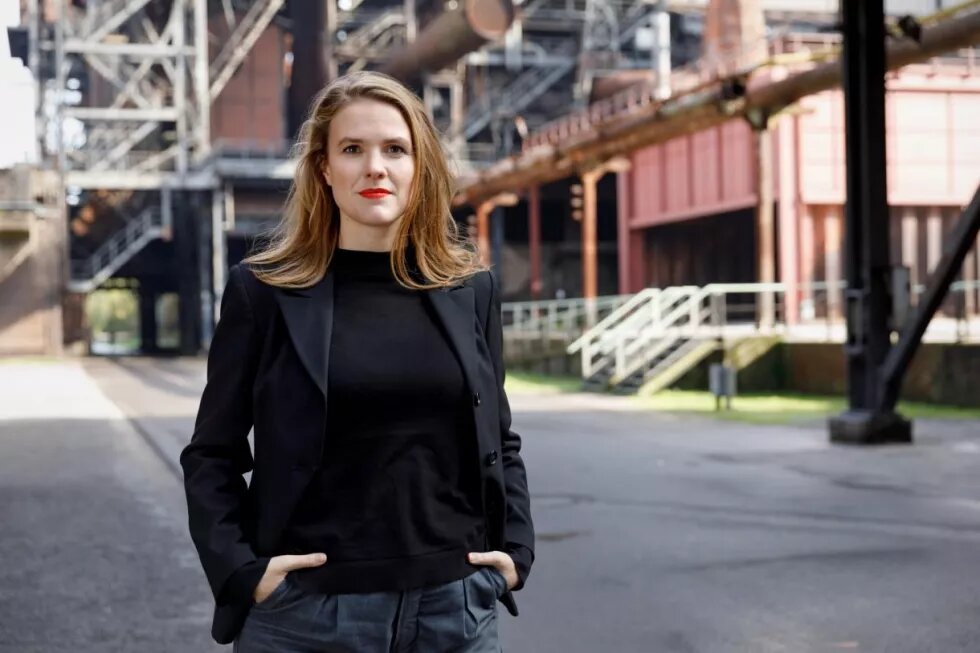In her interview with Dr. Christine Pütz, Terry Reintke, Co-President of the Greens/EFA Group in the European Parliament, offers her opinion on the study “Actually European?! Citizen Expectations towards German EU Policy in the Context of Crisis and Transformation” and makes the case for Germany’s commitment to show its dependability and solidarity.

Christine Pütz (CP): The Heinrich-Böll-Foundation has, in cooperation with Das Progressive Zentrum, published the fifth annual instalment of the Actually European!? survey on how Germans perceive their country’s role within the EU. The study reveals that an even greater majority of those surveyed this year would like to see Germany take on a more active role within the EU. You are Co-President of the Greens/EFA Group in the European Parliament that is comprised of 17 national delegations. Do your European colleagues share this German wish?
Terry Reintke (TR): What makes our Group so strong is that it reflects European diversity, with very divergent political traditions and national contexts, and houses them all under one roof. All of us within the Group are fighting for ambitious climate legislation, civil liberties and fundamental rights as well as social justice across the EU. And, it goes without saying, that Germany should play an even greater active role in achieving these goals. But, all commitment to our goals aside, one thing has always been clear: On these matters, if Germany wants to demonstrate that it is responsible and reliable, it must work in solidarity with its European partners to find common solutions, whilst also being attentive to the concerns of others.
“Gender pay gap, minimum wage, climate legislation, sanctions. I also see what we have already achieved in Brussels since the ‘traffic light coalition’[1] came into office.”
CP: The German government is facing huge challenges. It has to bring short-term crisis management and a long-term future-oriented strategy under one roof. Three-quarters of the country’s citizens believe that the German government has yet to deliver on its promise to “constructively” shape European policymaking as enshrined in its coalition agreement. As a Member of the European Parliament, which is typically a driving force when it comes to policymaking and reforms in the EU, how do you view Germany’s European policy?
TR: I see what we have already achieved in Brussels since the “traffic light coalition” came into office. So much of this happens without much fanfare, and maybe the public does not always notice this. Take the Pay Transparency Directive, for example, that aims to narrow the gender pay gap, or the new uniform rules for fair minimum wages and, of course, the achievements made through climate legislation. And then, there are the sanctions levied against Russia, the commitment to the rule of law and fundamental freedoms. Now is not the time for us to let up in these areas. But, Brussels also takes very careful note of who is constructive and drives things forward and who sits out or even thwarts progress. One of the questions I hear a lot at the moment is how can a social-democratic Chancellor allow himself to be made to look foolish by the liberal FDP in Brussels on social and climate issues.
CP: Given the huge challenges facing Europe, Germany, as the largest member state, has a special responsibility, which – as you have already pointed out – goes hand in glove with the high expectations of many of its EU partners. But, what role should Germany play within the EU? The coalition agreement refers to an “understanding that serves the EU as a whole”. Is the German government even able to meet this requirement at all? Germany, like many other member states, pursues its own interests in Brussels – the most recent example of this, of course, being the last-minute blocking of a ban on the sale of cars with internal combustion engines, scheduled to begin in 2035, that had already been negotiated.
TR: Germany is among the member states that profit the most from the European single market and strong European integration. As such, Germany will, of course, always defend its own interests whenever it reaches decisions and acts in the common interest of European integration. This means: Using a sledgehammer to force through individual interests that oppose previously reached agreements goes against the European spirit and, by extension, harms German interests.
“Germany must try to strike compromises early in the game.”
CP: A majority of those surveyed came out in favour of reforms – above all the abolition of veto powers for Member States in the European Council – as a way of making the EU more effective and ready for enlargement. The Greens also back the expansion of majority voting. That being said, many of the smaller Member States have serious concerns, as they argue it would vastly weaken their political clout. How should Germany set about dealing with these concerns?
TR: I hope that we will soon be able to make progress in this area. But, that will only happen if we can get the smaller Member States on board. Germany needs to make its positions known early on, whilst also taking the needs and sensitivities of the smaller Member States into account and trying to strike compromises early in the game. I believe that the majority of the smaller states are also willing to do the same, because they, too, are dissatisfied with the current situation. To give you an example: Whenever the issue turns to standing up to a warmonger like Russia’s Putin and displaying unity, individual Member States should not be able to blackmail the others. Because what it comes down to is this: Individual countries must not be allowed to take the rest of the Union hostage.
“We need to repeatedly show how much Germany profits from the European Single Market and the EU.”
CP: The study is being published for the fifth year in a row. Looking at long-term developments, it is apparent that people’s faith in the economic benefit of the EU appears to be declining, but that their expectations that the EU can be effective and provide solutions remain high. What does this discrepancy tell you and how should politicians go about dealing with this?
TR: Quite clearly, the European Union is viewed as a community – and rightly so – that brings common solutions to bear which provide Europeans with more benefits than individual national solutions can offer. This is the case with challenges affecting the entire EU, like the Covid-19 crisis, for example. We have agreed on a common EU vaccination pass or collectively procured vaccines, for example. Today, in the face of Russia’s war of aggression against Ukraine, and the climate crisis, EU citizens are very clear on one thing: We can only overcome these challenges in Europe if we stick together. For us, this means: We need to repeatedly show how much Germany profits from the European Single Market and the EU.
“The European Union is founded on a promise of prosperity. We need to plausibly implement this for everyone.”
CP: The findings of the survey illustrate that the majority of citizens are looking for more action from Europe in areas where insecurity is particularly high: energy supply, defence capabilities, as well as social security and combating inflation. As in the years before, the survey has also illustrated that, more than anything, economically vulnerable groups call the benefits of a unified Europe into question. They clearly doubt that Europe can have a positive impact on their own lives. How can Europe renew its promise of prosperity for all and bolster social cohesion?
TR: We need to take this very seriously; more emphasis must be placed on social justice in our European policy and in European legislation. The Covid-19 crisis and, prior to this, the financial and economic crisis, have intensified social inequalities: Many people are struggling with how to make ends meet. This is exactly where we need to get to grips with the issue. The European Union is founded on a promise of prosperity. We need to plausibly implement this for everyone. We need to finally find and deliver a social narrative at the European level, which actually reaches people. We have, for example, adopted new regulations on the minimum wage and minimum income – that is a big step forward, but not enough. For example, when it comes to climate legislation, the social dimension has to be taken into consideration. Which is why we are calling for an EU investment fund that helps private households finance their home insulation, solar panels or heat pumps, and also small or medium-sized enterprises to convert to renewable energies.
“It is vital that we push forward with the Green Transformation now.”
CP: As in the preceding years, the vast majority of citizens came out in favour of common investments for future-oriented issues. A majority (56%) also specifically supports an EU investment fund that promotes a green, climate-neutral industry across Europe. What do you believe the next steps for future investments should be?
TR: It is vital that we push forward with the Green Transformation now if we want to remotely achieve the goals of the Paris Agreement. We need to rely on renewable energies, and support companies in their efforts to run climate-neutral production facilities. Large, energy-intensive industrial companies, like ThyssenKrupp, are counting on green hydrogen as they move forward. So, the industry is ready, but it also needs to be supported. And by that, I mean everywhere – not just in Germany, but also in Italy or Poland. The USA has already shown us the way ahead and is granting huge tax concessions to carbon-neutral producing companies. If we want to avoid European industry becoming a museum-piece in the foreseeable future, because all the innovative companies have turned their backs on us, then now is absolutely the time to invest massively in renewable energies and climate-neutral technologies. Just like with the Covid-19 Recovery Fund, we need to create a common European investment fund.
“Russia’s war of aggression is also about defending our modern democratic social order.”
CP: In closing, I have one last question: You are very committed to the rule of law and minority rights. Russia’s war of aggression against Ukraine is presenting Europe with new challenges. How can we prevent that democracy becomes an afterthought to the new imperatives of European security and the therefore necessary alliances within the EU?
TR: In terms of Russia’s war of aggression against Ukraine, this is what it is about: Putin wants to violently impose his authoritarian system on a sovereign neighbouring country, because this country has opted to open itself to the path taken by the EU and thus for the Western model of a value-based liberal democracy. As such, it is also about defending our modern democratic social order, which is founded on the rule of law, fundamental rights and freedoms. If European solidarity against Putin’s war of aggression now results in the erosion of the democratic rule of law, then that would be the greatest mistake that we could possibly make.
This interview was first published in German on boell.de.
[1] In Germany, the colours of the three political parties forming the current coalition government are such that, when placed in the corresponding order, they resemble those of a traffic light, hence the coining of the term 'traffic-light coalition'.
This article first appeared here: eu.boell.org

